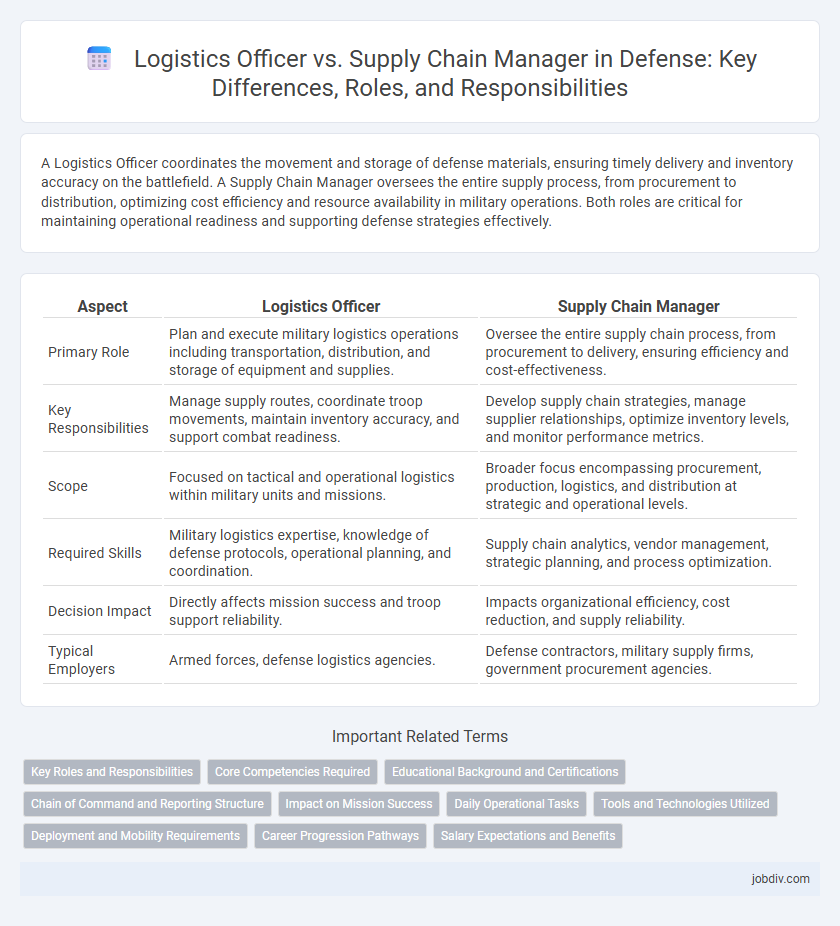A Logistics Officer coordinates the movement and storage of defense materials, ensuring timely delivery and inventory accuracy on the battlefield. A Supply Chain Manager oversees the entire supply process, from procurement to distribution, optimizing cost efficiency and resource availability in military operations. Both roles are critical for maintaining operational readiness and supporting defense strategies effectively.
Table of Comparison
| Aspect | Logistics Officer | Supply Chain Manager |
|---|---|---|
| Primary Role | Plan and execute military logistics operations including transportation, distribution, and storage of equipment and supplies. | Oversee the entire supply chain process, from procurement to delivery, ensuring efficiency and cost-effectiveness. |
| Key Responsibilities | Manage supply routes, coordinate troop movements, maintain inventory accuracy, and support combat readiness. | Develop supply chain strategies, manage supplier relationships, optimize inventory levels, and monitor performance metrics. |
| Scope | Focused on tactical and operational logistics within military units and missions. | Broader focus encompassing procurement, production, logistics, and distribution at strategic and operational levels. |
| Required Skills | Military logistics expertise, knowledge of defense protocols, operational planning, and coordination. | Supply chain analytics, vendor management, strategic planning, and process optimization. |
| Decision Impact | Directly affects mission success and troop support reliability. | Impacts organizational efficiency, cost reduction, and supply reliability. |
| Typical Employers | Armed forces, defense logistics agencies. | Defense contractors, military supply firms, government procurement agencies. |
Key Roles and Responsibilities
Logistics Officers in defense primarily oversee the coordination and movement of troops, equipment, and supplies to ensure operational readiness and mission success. Supply Chain Managers focus on the strategic planning and management of procurement, inventory control, and supplier relationships to optimize resource availability and cost efficiency. Both roles require expertise in transportation, inventory management, and resource allocation, but Logistics Officers emphasize tactical execution while Supply Chain Managers drive long-term supply resilience and efficiency.
Core Competencies Required
Logistics Officers in defense require expertise in inventory management, transportation coordination, and tactical supply distribution to ensure mission readiness under combat conditions. Supply Chain Managers focus on strategic planning, vendor relations, and procurement processes to optimize cost-efficiency and sustainment across the entire supply network. Both roles demand strong analytical skills, risk management capabilities, and proficiency in logistics information systems tailored to defense operations.
Educational Background and Certifications
Logistics Officers typically possess degrees in logistics, supply chain management, or military science, often supplemented by specialized defense logistics training. Supply Chain Managers usually hold bachelor's or master's degrees in business administration, supply chain management, or industrial engineering, with certifications like APICS CPIM or CSCP enhancing their expertise. Both roles benefit from certifications such as Six Sigma or PMP to optimize operational efficiency within defense logistics frameworks.
Chain of Command and Reporting Structure
A Logistics Officer in the defense sector operates within a strict military chain of command, reporting directly to commanding officers and ensuring operational readiness through disciplined logistics support. In contrast, a Supply Chain Manager typically functions within a corporate or government agency structure, overseeing procurement, inventory, and distribution while reporting to senior management or supply directors. The Logistics Officer's role emphasizes hierarchical accountability and mission-critical supply flow, whereas the Supply Chain Manager balances efficiency and cost-effectiveness in a less rigid reporting environment.
Impact on Mission Success
Logistics Officers coordinate the movement, maintenance, and distribution of military resources, ensuring timely support that directly influences operational readiness and mission success. Supply Chain Managers optimize procurement, inventory control, and supplier relationships to maintain uninterrupted supply lines critical for sustained defense operations. Efficient collaboration between these roles minimizes delays, reduces costs, and enhances overall mission effectiveness by securing essential materials and equipment where they are needed most.
Daily Operational Tasks
Logistics Officers in defense coordinate the movement, storage, and distribution of military equipment and personnel, ensuring timely delivery under strict operational conditions. Supply Chain Managers oversee the broader procurement, inventory management, and supplier relations to maintain continuous flow of materials and resources. Daily operational tasks of Logistics Officers emphasize tactical deployment and real-time problem-solving, while Supply Chain Managers focus on strategic planning and resource allocation across multiple defense units.
Tools and Technologies Utilized
Logistics Officers primarily utilize military-grade inventory management software, GPS tracking systems, and secure communication networks to coordinate troop movements and equipment distribution efficiently. Supply Chain Managers rely on advanced ERP systems, data analytics platforms, and automated procurement tools to optimize supplier relationships and streamline commercial supply chains. Both roles leverage RFID technology and real-time data analytics to enhance operational visibility and asset management within defense logistics.
Deployment and Mobility Requirements
Logistics Officers in defense prioritize rapid deployment and mobility, ensuring seamless coordination of troop movements and timely delivery of essential equipment under dynamic operational conditions. Supply Chain Managers focus on optimizing procurement, inventory management, and distribution networks with an emphasis on sustaining long-term supply chain resilience across multiple theaters. Both roles require advanced expertise in transportation logistics, but Logistics Officers emphasize tactical agility while Supply Chain Managers ensure strategic supply continuity.
Career Progression Pathways
A Logistics Officer in defense typically advances through ranks by gaining expertise in tactical supply distribution, transportation coordination, and inventory management within military operations. Progression often leads to senior leadership roles such as Logistics Operations Manager or Defense Supply Chain Director, where strategic planning and resource optimization are key responsibilities. Supply Chain Managers usually transition from civilian sectors to defense by leveraging skills in procurement, supplier relationship management, and demand forecasting, advancing toward roles like Global Supply Chain Executive or Defense Contracting Specialist.
Salary Expectations and Benefits
Logistics Officers in defense typically earn between $60,000 and $90,000 annually, with benefits including military-specific healthcare, housing allowances, and retirement plans, reflecting government employment structures. Supply Chain Managers in defense-related industries command higher salaries ranging from $80,000 to $120,000, often supplemented by performance bonuses, comprehensive insurance, and corporate retirement benefits tied to private sector standards. Salary expectations and benefits differ significantly due to the public versus private sector employment frameworks, influencing compensation packages and career advancement opportunities.
Logistics Officer vs Supply Chain Manager Infographic

 jobdiv.com
jobdiv.com